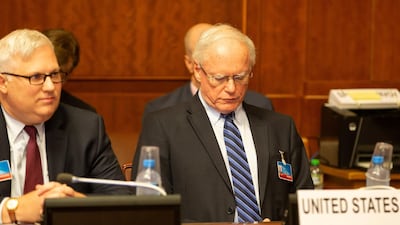Ever since the Assad regime made clear its intention to launch an offensive to take back Idlib, the last province outside its control, the Trump administration has gradually upped the ante in its Syria policy, intensifying diplomatic contacts, threatening military strikes and scrapping planned troop withdrawals from Syrian territory.
Earlier this month, Donald Trump warned Syrian President Bashar Al Assad he “must not recklessly attack Idlib”, and that doing so would make the United States “very angry”.
As Mr Trump grew more bellicose, the US military started preparing options for the White House in the event the Syrian regime ignored warnings against using chemical weapons in Idlib. On the other side of Pennsylvania Avenue, the State Department went into full consultation mode, sending newly appointed Syria envoy James Jeffrey and Deputy Assistant Secretary Joel Rayburn to Jordan, Israel and Turkey to discuss Idlib. The National has learnt that Mr Rayburn visited Brussels last week to continue those consultations with the Europeans. At the Security Council in New York, US Ambassador Nikki Haley chaired two meetings on the situation in Syria.
In Washington, experts and analysts began exploring the options available to the US, seven years into the war in Syria, to save about 3 million people in Idlib from a military onslaught.
Michael O’Hanlon and Steve Heydemann, authors of the new Brookings Institution report “A 10-degree shift in Syria strategy”, favour US action to counter an Assad offensive in Idlib.
Mr O’Hanlon, who specialises in defence issues, said the US “should be militarily willing to prevent Mr Assad from using his helicopters, aeroplanes, or artillery against apartment buildings and other purely civilian targets” in Idlib.
But this tougher military posture should be coupled with a softer approach on the political front, towards both Mr Al Assad and his ally Russia. “The idea of negotiating Mr Al Assad out of power is not going to happen and it actually is counterproductive even to have that as a goal,” he said. “We suggest that the US acknowledges that Mr Al Assad is going to stay in power for some time, that he himself will be the one to choose his successor … and we try to work with the autonomous areas like the Kurdish north-east and the region around Idlib to do some reconstruction in those zones.”
Mr Heydemann, a Syria scholar and expert, argued that by “amplifying the stakes to the regime on Idlib" the US could avoid the need to have to carry out retaliations.
The US leverage in Idlib "derives from the commitment to act in the event that the regime uses certain kinds of weapons" and this threat has already worked as deterrent, forcing a rethink by Russia and a delay in the offensive, Mr Heydemann told The National.
“What makes Idlib different is precisely that this is the last remaining piece of territory outside the regime's control that contains this kind of presence of both opposition fighters and more extremist jihadists,” he said. Its border with Turkey, the risk of a humanitarian catastrophe, and using this as an opening to negotiations with Russia on reconstruction and economic recovery, have forced the US to reconsider its approach in Syria.
_______________
Read more:
Russian and Turkish leaders to meet Monday to discuss the fate of Syria's Idlib
Putin the puppeteer is pulling the strings of troika counterparts ahead of battle for Idlib
As the Syrian war nears its end, a tense new struggle is materialising
_______________
But Faysal Itani, a fellow at the Atlantic Council's Rafik Hariri Middle East Center, said the US noise has “little to do with Idlib — it’s more of this being the first ‘test case’ for a new chapter in US policy”.
There have been signals that the Trump administration wants to "get tougher on the regime and repair US relations with Turkey", he told The National. Idlib "is a good place to do this, since it's the last place still in opposition hands and Turkey doesn't seem happy about the prospects of a regime offensive there".
Mr Itani was more sceptical about US military options in Idlib, however, questioning whether Washington "has the appetite to handle the backlash from Iran and Russia”.
“No one wants a confrontation with Russia," he said. "I do not think Russia would go to war with the United States over Idlib but there are other ways to make life difficult for the United States elsewhere.”
Besides, the US would like to see the destruction of extremist groups in Idlib such as Hayat Tahrir Al Sham, which would require US-Turkish co-operation in the province, Mr Itani said.
But Nicholas Heras of the Center for New American Security argued that the US could be prompted to take military action in Idlib as a way by pressure the regime to return to UN-mediated talks on peace and a political transition in Syria.
Mr Trump's new Syria team "is determined to revive the Geneva process … and there is no workable Geneva process if Greater Idlib falls to Bashar Al Assad because there would then be no significant piece of opposition-held territory left in Syria", Mr Heras told The National.
The plan is “to support Turkey to hold the line against Mr Al Assad … and the Trump administration is coming around to the idea that it will strike Bashar Al Assad if he launches a ground invasion of Idlib”, he said.
“If that decision is in fact made, it could be a turning point in the conflict, all to revive the Geneva process.”
Mr Itani said he did not see Mr Al Assad compromising on his goal to reclaim Idlib, or at Geneva talks. “No, under no circumstances can I imagine this happening — he could do it temporarily, but only as a temporary tactic.”

